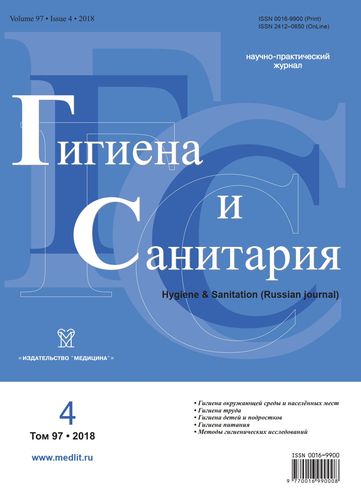Comprehensive ecological-hygienic evaluation of environmental objects of the territory under harmful climatic and anthropogenic exposure
- Authors: Khanturina G.R.1, Namazbaeva Z.I.2, Zhumabekova G.S.3, Seitkasymova G.Z.1, Fedorova I.A.2
-
Affiliations:
- Karaganda State Technical University
- National Center of Occupational Health and Occupational Diseases, Ministry of Health of the Republic of Kazakhstan
- Karaganda State Medical University
- Issue: Vol 97, No 4 (2018)
- Pages: 293-296
- Section: ENVIRONMENTAL HYGIENE
- Published: 20.10.2020
- URL: https://medjrf.com/0016-9900/article/view/640300
- DOI: https://doi.org/10.47470/0016-9900-2018-97-4-293-296
- ID: 640300
Cite item
Full Text
Abstract
Adverse climatic and anthropogenic factors can affect the health of people living near the dried-up Aral Sea. There was modified the comprehensive assessment of inorganic chemical pollution of the environment of the village in the Zhosaly Kyzylorda region of Kazakhstan. The comprehensive assessment score included 5 categories: satisfactory, intense, critical, crisis, catastrophic. According to own research over 2014–2015 based on the mentioned assessment score, the comprehensive assessment score amounted to 41 points and showed a critical situation. In the air, there was observed the phenol content of 1.02 MAC, suspended solids — 0.5 MAC. The main part of the fine suspended solids sized of 1.5–2.5 mm, round shape, was formed in the process of condensation and evaporation of the sea and the Syr Darya River. In the dust, there was found the excess in silicon content of 2.8 MAC, iron — 1.3 MAC, zinc 1.1 MAC. As soil pollutants, there were detected sulfates — of 173.5 MAC, chlorides — 9.0 MAC, mercury — 0.56 MAC, nickel — 0.49 MAC. In drinking water, there was revealed cadmium excess of 1.3 MAC, nickel — 1.2 MAC, chlorides — 1.25 MPC, sulfates — 1.0 MAC. In the water of the Syr Darya River, there was revealed an excess in nickel — of 2.2 MAC, sulfates — 1.8 MAC, dissolved oxygen — 2.0 MAC. In the sediments of the Syr Darya river, the sulfate content accounted for 3.36 MAC and chlorides — 1.53 MAC. In the snow cover there was revealed an excess of manganese — 5.14MPC, chromium — 2.04 MAC, zinc — 1.2 MAC. In a critical situation a significant portion (30–50%) of the population may be in a state of exertion and adaptation surge, and the most susceptible part seems to be in a state of adaptation failure, characterized by an increase in incidence rate.
Keywords
About the authors
Gulnara R. Khanturina
Karaganda State Technical University
Author for correspondence.
Email: gkhanturina@gmail.com
Associated Professor of the Department of Chemical Technology, Karaganda State Technical University, Karaganda, 100000, Kazakhstan.
e-mail: gkhanturina@gmail.com
Russian FederationZ. I. Namazbaeva
National Center of Occupational Health and Occupational Diseases, Ministry of Health of the Republic of Kazakhstan
Email: noemail@neicon.ru
Russian Federation
G. S. Zhumabekova
Karaganda State Medical University
Email: noemail@neicon.ru
Russian Federation
G. Zh. Seitkasymova
Karaganda State Technical University
Email: noemail@neicon.ru
Russian Federation
I. A. Fedorova
National Center of Occupational Health and Occupational Diseases, Ministry of Health of the Republic of Kazakhstan
Email: noemail@neicon.ru
Russian Federation
References
- Onishchenko G.G. Complex hygienic estimation of the degree of intensity of medical and ecological situation of various territories, caused by toxic pollution of the population living — method. recomm., 1997.
- Рrogram to comprehensively address the problems of the Aral Sea region for 2004-2006.
- Ruziyev I.B. Ed. VA Spiritual. A comprehensive solution to the problems of water and land resources in the EECCA region: collection of scientific papers, Tashkent, 2010 .
- Arystanov G.T. Hygienic characteristics of the quality of the environment in the zone of ecological disaster Aral Sea region (on the example of the Aral district of Kyzylorda region): Abstract. ... Cand. med. Sciences: 14.00.07. Almaty: Republic of Kazakhstan, 2000.
- Chikisheva T.A. Study links anthropological features with environmental factors (in the example of the Altai — Sayan region). Novosibirsk, 1992.
- Dauranov I.G. Yermekova S.A. Medical statistics and immuno-hematology parallels in the study of public health Novo Kazaly region Kyzylorda region. Actual questions of hygiene and health protection of agriculture: Sat. Scien. works. Almaty GiPZ Research Institute, 1992.
- Shimsiyarov N.N., Galeev K.A., Khakimov R.F. et al. Quantitative assessment of air pollution effects on the incidence of children with acute respiratory infections of the upper respiratory tract. Gigiena i Sanitaria (Hygiene and Sanitation, Russian journal). 2002.(4)^11-13.
- Kolenchukova O.A., Savchenko A.A. The microflora of the pharynx and the immune status of those living in areas with different anthropogenic loads. Occupational Medicine and Industrial Ecology. 2005(9): 9-13.
- Tabakaev M.V., G.V. Artamonova The impact of air pollution particulate matter on the incidence of cardiovascular diseases among the urban population. Abstract Journal. 2015(4):16.
- Blinov D.S., Chernova N.N., Balykova O.P., Lyapina S.A., Chugunova L.A. Hygienic characteristics of the Republic of Mordovia population morbidity due to iodine deficiency. Gigiena i Sanitaria (Hygiene and Sanitation, Russian journal). 2015(1): 61-64.
Supplementary files









